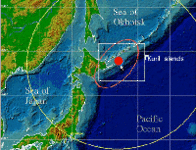What cannot be cured must be endured
 Japan does not have any intention to forgive Russian President Medvedev for his recent visit to the Kuril Islands. Tokyo refused to sign an economic agreement with Moscow. Japan's Economics Minister Akihiro Ohata described Medvedev's visit to the islands as "regrettable" and did not even arrive for the Russian-Japanese investment forum, which currently takes place in Japan's capital.
Japan does not have any intention to forgive Russian President Medvedev for his recent visit to the Kuril Islands. Tokyo refused to sign an economic agreement with Moscow. Japan's Economics Minister Akihiro Ohata described Medvedev's visit to the islands as "regrettable" and did not even arrive for the Russian-Japanese investment forum, which currently takes place in Japan's capital.
The Economics Minister of Japan struck the forum out of schedule and sent his deputy there instead. Russia's Minister for Economic Development, Elvira Nabiullina, left the forum soon too, and it seemed that the event ended with nothing.
The above-mentioned economic agreement was supposed to regulate Japan's investments in the Russian economy, including Russia's energy projects.
Japan's Chief Cabinet Secretary Yoshito Sengoku stated that the signing of the agreement had been delayed. The delay, the official added, was not connected with Medvedev's recent visit to the Kurils.
A long-standing territorial dispute between Moscow and Tokyo over the Kuril Islands, called the Northern Territories by Japan, was aggravated by Medvedev's visit to Kunashir. Tokyo has described the visit, the first trip by a Russian president to the disputed islands, as "regrettable," while Moscow argued it is up to the Russian authorities to decide on their trips inside the country. Japan recalled its ambassador from Russia for several days after the visit. The ambassador returned, but Japan refused to admit that the debate was over.
Scientist of politics Alexander Kulanov believes that Japan's refusal to sign the economic cooperation agreement will not lead to any serious consequences to Russia.
"It was a framework agreement, which could not threaten the development of trade and economic agreements with Japan. Even though that the Japanese officially stated that their refusal to sign the agreement was not based on Medvedev's recent visit to the disputed islands, I am certain that these two things are strongly interconnected. The Japanese ambassador returned to Moscow very soon after the scandal - on November 7. Russian officials considered it a good sign. However, the Japanese then refused to sign the agreement. In other words, Japan said no to improving the relations with Russia because of the Kurile issue.
"One should not consider this a tragedy, though. They will sign a similar agreement anyway. There is every reason to believe that Tokyo has made the pause to polish the agreement. The things that happened testify to Japan's determination to show its temper before the meeting of Russian and Japanese leaders on November 13. It's not in Japan's interests to complicate the relations with Russia. The Russian market brings huge profits to Japanese corporations, which they do not intend to lose," the scientist said.
Ivan Rodionov, a professor of Russia's Higher School of Economics, also believes that Japan's recent decision will not have any consequences for Russia.
"Some may find it strange, but Japan has never been a highly important economic partner with Russia. As for that particular agreement, it goes about Japan's cooperation with Russia's Far East only. Russia already cooperates with China and South Korea on all questions that interest Japan. I'm talking about energy, and not just oil and gas, but also coal, timber and metals. China takes an advantage over Japan at this point, but the Japanese apparently believe that it's not much big of a deal. What cannot be cured must be endured, so to speak," the professor said.
Sergey Balmasov
Pravda.Ru
Read the original in Russian
Subscribe to Pravda.Ru Telegram channel, Facebook, RSS!





